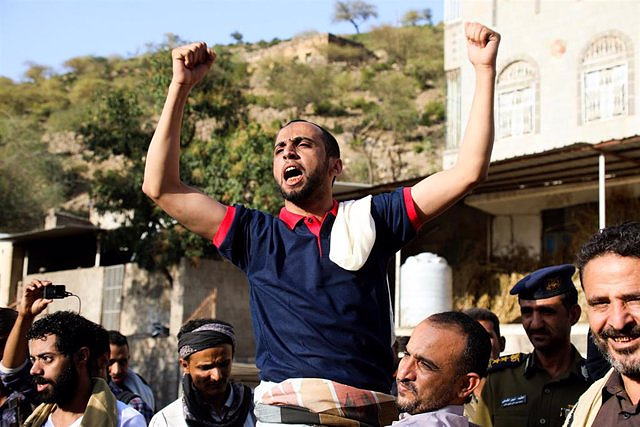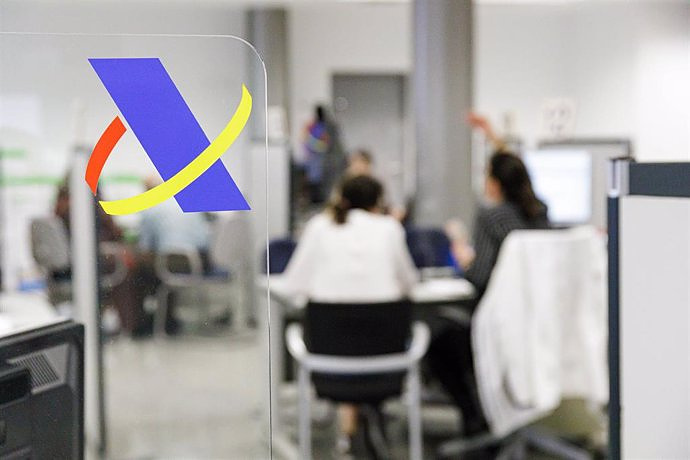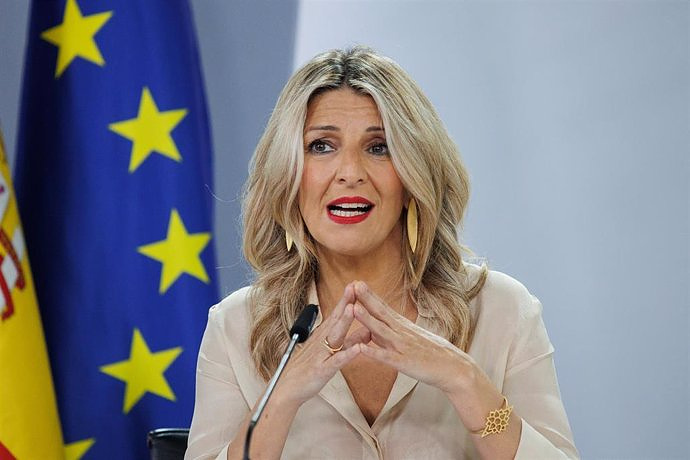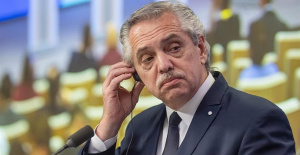A delegation of representatives from Saudi Arabia and Oman arrived last night in the Yemeni capital, Sanaa, to discuss with the leaders of the Huthi insurgency the possibility of launching a peace process to end almost a decade of war. civilians in the country, as confirmed by sources from the Supreme Political Council, the highest political body of the rebels.
The attendance of Saudi representatives represents a turning point given that Riyadh is the great ally of the Yemeni government recognized by the international community in the fight against the Houthis, backed by Iran, in what has long been considered a "war through third parties" between Iran and Saudi Arabia, but the recent normalization of diplomatic relations between the two great regional rivals has opened a window of hope for the end of the conflict.
"The Omani and Saudi delegations," reported sources from the unofficial Houthi news agency Saba, "will meet with the president of the Supreme Political Council, Field Marshal Mehdi al Mashat, about lifting the 'siege', with all their consequences" as well as "the end of the aggression"; the Houthis' term for Saudi military assistance during the war, "and the restoration of the rights of the Yemeni people."
Among the more specific issues that the delegation and the Huthi leadership will address will be "the payment of salaries to civil servants and the profits from oil and gas," the statement added.
Officially, the Houthis have only recognized the presence in the country of a delegation from Oman -- a mediator in the ceasefire efforts between the insurgents and the Yemeni Army -- which was received last night by the chief Houthi negotiator, Mohamed Abdulsalam. , as announced by the mediator himself on his Twitter account.
As a prelude to the visit of the delegations, Saudi Arabia has released 13 Houthi prisoners of war in the framework of a complicated process of exchanging detainees which, however, seems to have made progress in the last few hours, according to insurgent sources.
The president of the National Committee for Prisoners' Affairs, Abdul Qadir al Murtadha, announced on Saturday on his Twitter account the arrival of his comrades at Sana'a international airport, after the insurgents released a Saudi prisoner in exchange.
Moreover, Al Murtadha has explained that the released Houthi prisoners of war are indeed part of a larger-scale exchange, agreed last month in Switzerland under the management of the United Nations, involving 887 fighters, and could culminate by the end of the next week.
"The detainees released today (for Saturday) are part of the agreement with the United Nations, which will end up being fully implemented next Thursday," he stressed.
The visit of this delegation occurs two days after the appearance of information about a new truce that could serve as a possible prolegomenon to a "comprehensive peace agreement" in the country, sources close to the negotiations said on Friday, on condition of anonymity. , to various Arab media.
The first part of this process would begin with the declaration of a new truce until the end of 2023, according to the Al Araby al Jadeed portal, which would be accompanied by a relaxation of the restrictions on flights to the capital, under the control of the insurgency. since the beginning of the conflict at the end of 2014, the resumption of crude oil exports and the total reopening of the country's highways.
The government and the Houthis already agreed on a ceasefire in April last year that contributed to a significant drop in violence for most of 2022. Although the truce was not extended in October, the tense calm lasted for the following months, but a new rise in hostilities since February has unleashed fears of a reactivation of the conflict.
This new truce would function as a prologue to a comprehensive peace agreement that, according to Yemeni sources to the Asharq Al Awsat newspaper, would operate under the auspices of the United Nations and would mean a continuation of the aspects agreed upon in the new ceasefire and would also incorporate two other factors. crucial: the unification of the institutions of the divided country and the total exchange of prisoners of war between both sides.
This process would take place in three phases of six months, three months and two years and would also involve Saudi Arabia and Iran as the two great international allies of the Yemeni government and the Houthis insurgents, respectively, as well as Oman.
The war in Yemen has ended up plunging what was one of the poorest countries in the world into the worst humanitarian catastrophe at present, according to the United Nations. More than 21 million Yemenis (two thirds of the population) will need humanitarian aid this year and 17 million of them will need to receive it urgently to survive.
The conflict has left almost 380,000 dead, either from the fighting or from hunger and disease; more than 85,000 of them children, to which must be added four million displaced persons, according to data considered by UN agencies.

 Exploring Cardano: Inner Workings and Advantages of this Cryptocurrency
Exploring Cardano: Inner Workings and Advantages of this Cryptocurrency Seville.- Economy.- Innova.- STSA inaugurates its new painting and sealing hangar in San Pablo, for 18 million
Seville.- Economy.- Innova.- STSA inaugurates its new painting and sealing hangar in San Pablo, for 18 million Innova.- More than 300 volunteers join the Andalucía Compromiso Digital network in one month to facilitate access to ICT
Innova.- More than 300 volunteers join the Andalucía Compromiso Digital network in one month to facilitate access to ICT Innova.-AMP.- Ayesa acquires 51% of Sadiel, which will create new technological engineering products and expand markets
Innova.-AMP.- Ayesa acquires 51% of Sadiel, which will create new technological engineering products and expand markets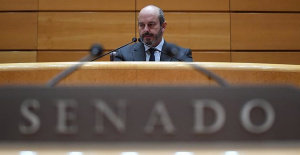 The amnesty faces its final stretch in the Senate with the question of whether it will be voted this week or after the Catalan elections.
The amnesty faces its final stretch in the Senate with the question of whether it will be voted this week or after the Catalan elections. The PP will send to Moncloa the 1,136 letters from citizens with their real problems that it received in Sánchez's reflection
The PP will send to Moncloa the 1,136 letters from citizens with their real problems that it received in Sánchez's reflection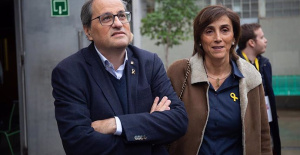 Carola Miró, wife of former president of the Generalitat Quim Torra, dies
Carola Miró, wife of former president of the Generalitat Quim Torra, dies 12M.- Díaz asks Sánchez to recognize the Palestinian State in the next Council of Ministers
12M.- Díaz asks Sánchez to recognize the Palestinian State in the next Council of Ministers How Blockchain in being used to shape the future
How Blockchain in being used to shape the future Not just BTC and ETH: Here Are Some More Interesting Coins Worth Focusing on
Not just BTC and ETH: Here Are Some More Interesting Coins Worth Focusing on A sensor system obtains the fingerprint of essential oils and detects if they have been adulterated
A sensor system obtains the fingerprint of essential oils and detects if they have been adulterated Faraday UPV presents the 'Origin' rocket to exceed 10 km of flight: "It is the beginning of the journey to space"
Faraday UPV presents the 'Origin' rocket to exceed 10 km of flight: "It is the beginning of the journey to space" The Generalitat calls for aid worth 4 million to promote innovation projects in municipalities
The Generalitat calls for aid worth 4 million to promote innovation projects in municipalities UPV students design an app that helps improve the ventilation of homes in the face of high temperatures
UPV students design an app that helps improve the ventilation of homes in the face of high temperatures A million people demonstrate in France against Macron's pension reform
A million people demonstrate in France against Macron's pension reform Russia launches several missiles against "critical infrastructure" in the city of Zaporizhia
Russia launches several missiles against "critical infrastructure" in the city of Zaporizhia A "procession" remembers the dead of the Calabria shipwreck as bodies continue to wash up on the shore
A "procession" remembers the dead of the Calabria shipwreck as bodies continue to wash up on the shore Prison sentences handed down for three prominent Hong Kong pro-democracy activists
Prison sentences handed down for three prominent Hong Kong pro-democracy activists ETH continues to leave trading platforms, Ethereum balance on exchanges lowest in 3 years
ETH continues to leave trading platforms, Ethereum balance on exchanges lowest in 3 years Investors invest $450 million in Consensys, Ethereum incubator now valued at $7 billion
Investors invest $450 million in Consensys, Ethereum incubator now valued at $7 billion Alchemy Integrates Ethereum L2 Product Starknet to Enhance Web3 Scalability at a Price 100x Lower Than L1 Fees
Alchemy Integrates Ethereum L2 Product Starknet to Enhance Web3 Scalability at a Price 100x Lower Than L1 Fees Mining Report: Bitcoin's Electricity Consumption Declines by 25% in Q1 2022
Mining Report: Bitcoin's Electricity Consumption Declines by 25% in Q1 2022 Oil-to-Bitcoin Mining Firm Crusoe Energy Systems Raised $505 Million
Oil-to-Bitcoin Mining Firm Crusoe Energy Systems Raised $505 Million Microbt reveals the latest Bitcoin mining rigs -- Machines produce up to 126 TH/s with custom 5nm chip design
Microbt reveals the latest Bitcoin mining rigs -- Machines produce up to 126 TH/s with custom 5nm chip design Bitcoin's Mining Difficulty Hits a Lifetime High, With More Than 90% of BTC Supply Issued
Bitcoin's Mining Difficulty Hits a Lifetime High, With More Than 90% of BTC Supply Issued The Biggest Movers are Near, EOS, and RUNE during Friday's Selloff
The Biggest Movers are Near, EOS, and RUNE during Friday's Selloff Global Markets Spooked by a Hawkish Fed and Covid, Stocks and Crypto Gain After Musk Buys Twitter
Global Markets Spooked by a Hawkish Fed and Covid, Stocks and Crypto Gain After Musk Buys Twitter Bitso to offset carbon emissions from the Trading Platform's ERC20, ETH, and BTC Transactions
Bitso to offset carbon emissions from the Trading Platform's ERC20, ETH, and BTC Transactions Draftkings Announces 2022 College Hoops NFT Selection for March Madness
Draftkings Announces 2022 College Hoops NFT Selection for March Madness